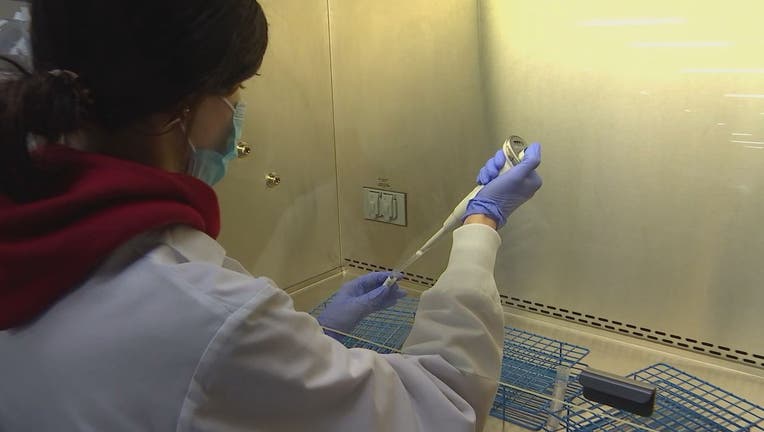Lab techs grapple with supply, staffing shortages amid increased COVID-19 testing

A lab technician at the HealthPartners central lab in Eden Prairie tests a specimen for COVID-19. (FOX 9)
EDEN PRAIRIE, Minn. (FOX 9) - As COVID-19 numbers continue to surge, some of the critical people within the health care system are lab technicians.
At the HealthPartners central lab in Eden Prairie, Minnesota, staff are working like never before to overcome supply and ongoing staffing shortages.

Lab techs grapple with supply, staffing shortages amid increased COVID-19 testing
As COVID-19 numbers continue to surge, some of the critical people within the health care system are lab technicians.
"When the pandemic first hit, you realize that you're being called to something that is greater than yourself," said Paige O’Keefe, a lab tech specialist.
For O'Keefe, running COVID-19 tests and supervising technicians inside the lab is emotional and hard work.
"You think it’s sweat dripping down their face, but you realize it’s sweat mixed with tears," said O’Keefe. "And we are just so exhausted."
With daily shipments coming from nine hospitals that have reached their own testing capacities plus eight drive-up COVID-19 test collection sites, lab technicians have gone from each handling about 300 specimens to 700 daily.
In addition to the usual tests for the flu, STDs and more, the Eden Prairie lab is averaging about 1,400 coronavirus tests each day. Healthcare workers, patients with symptoms and those preparing for surgery take top priority.
"We’d like to get to 4,000 [COVID-19 tests per day] here. I think we’ll be able to do that in the next two months," said Heaton.
Dr. Phil Heaton points out various supply shortages for everything from collecting samples to running tests continue to change by the day. Several testing machines run at roughly 50 percent capacity.
"All because there is not enough supply for us to do that," said Heaton. "We are better than where we were, but we are not alone. Labs all over are facing issues and shortages."
There’s also been a shortage of lab employees working in this field since well before the pandemic.
"65 people is a pretty amazing number for the amount of tests that we do," said Jackie Williams, the central lab manager.
The biggest change at the lab is the lights are now always on. It’s is a 24/7 operation and that will continue for the foreseeable future.
"More people volunteering for an overnight shift than we needed, who gets lucky enough to work with people like that? We do," said O'Keefe.
For those and many more reasons, O’Keefe and her fellow coworkers are very proud of the quiet, yet crucial role they are playing in a pandemic.
"Because this is who we are and this is what we do," said O'Keefe.

